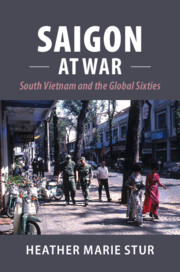Book contents
- Saigon at War
- Cambridge Studies in US Foreign Relations
- Saigon at War
- Copyright page
- Dedication
- Contents
- Figures
- Acknowledgments
- Introduction
- 1 The Heart of South Vietnam
- 2 A Tradition of Activism
- 3 South Vietnam’s Sixties Youth
- 4 South Vietnam and the World
- 5 Building Connections between the People and the Government
- 6 Saigon after Tet
- 7 The Catholic Opposition and Political Repression
- 8 Saigon in the Seventies
- Conclusion
- Select Bibliography
- Index
Introduction
Published online by Cambridge University Press: 15 May 2020
- Saigon at War
- Cambridge Studies in US Foreign Relations
- Saigon at War
- Copyright page
- Dedication
- Contents
- Figures
- Acknowledgments
- Introduction
- 1 The Heart of South Vietnam
- 2 A Tradition of Activism
- 3 South Vietnam’s Sixties Youth
- 4 South Vietnam and the World
- 5 Building Connections between the People and the Government
- 6 Saigon after Tet
- 7 The Catholic Opposition and Political Repression
- 8 Saigon in the Seventies
- Conclusion
- Select Bibliography
- Index
Summary
It was a tense week in Saigon in October 1974, when a South Vietnamese university student slipped into the office of the city’s archbishop to deliver a letter addressed to North Vietnamese youth. Archbishop Nguyen Van Binh was headed to the Vatican for an international meeting of Catholic leaders, and he promised the student he would hand the letter off to his Hanoi counterpart when he saw him at the conference. The letter implored North Vietnamese students to join southern youth in demanding an end to the fighting that the 1973 Paris Peace Agreement was supposed to have halted. Both the archbishop and the student risked arrest for circulating the letter. Authorities had raided the offices and shut down the operations of four newspapers that had published it. That the leader of South Vietnam’s Catholics would be involved in clandestine communication between North and South Vietnamese students would have been surprising in the early 1960s, but by the mid-seventies, many Vietnamese Catholics had grown weary enough of the war that they saw peace and reconciliation, even if under Hanoi’s control, as the better alternative to endless violence.1
- Type
- Chapter
- Information
- Saigon at WarSouth Vietnam and the Global Sixties, pp. 1 - 24Publisher: Cambridge University PressPrint publication year: 2020

